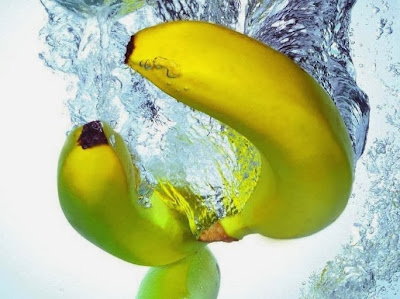>Exámenes selectividad inglés resueltos C. Madrid
 Although there is no research data to back the surprising claim that Mozart's music can have an effect on food, one reason for its popularity can be found in the theory that high frequency sounds have relaxing and rejuvenating effects on humans. The music of Mozart happens to be rich in such frequencies, but do bananas ripened to the tunes of Mozart taste better?
Although there is no research data to back the surprising claim that Mozart's music can have an effect on food, one reason for its popularity can be found in the theory that high frequency sounds have relaxing and rejuvenating effects on humans. The music of Mozart happens to be rich in such frequencies, but do bananas ripened to the tunes of Mozart taste better?A Japanese fruit company, Toyoka Chuo Seika, says they do. Arriving as ordinary unripe bananas from the Philippines, "Mozart bananas" are in for a surprise. "Piano Concerto 5 in D major", among other works, plays continuously for one week in their ripening chamber. The result, the company says, is a sweeter banana. And consumers agree: "Mozart bananas", which made their debut last July, are more expensive than ordinary bananas, but sales are sky-rocketing. Bananas are not the only food item which the Japanese subject to classical music. Over the past few decades, a wide variety of foods and beverages, exposed to classical vibrations, can be found in Japanese supermarkets: sake, soy sauce, noodles, mushrooms or "Beethoven Bread”.
Even tomatoes are listening to Mozart in Japan. Hiroko Harada, the manager of Star Drop Tomatoes, has placed speakers throughout nine greenhouses, quietly streaming Mozart for about 10 hours a day, from October through May. "The most important thing," said Harada, "is that the music creates a relaxed and comfortable environment for us to work in, and that has a positive effect on the tomatoes.” They have three times more iron and vitamin C than regular tomatoes and Harada feels that Mozart, along with skilled organic farming, plays a role.
RESPUESTAS
I. READING COMPREHENSION
1. Are the following statements TRUE or FALSE? Copy the evidence from the text. No marks are given for only TRUE or FALSE.
a) The so-called “Mozart bananas” are grown in Japan.
b) Even though “Mozart bananas” are not more economical, sales are increasing.
2. In your own words and based on the ideas in the text, answer the following questions.
Do not copy from the text
a) How do Mozart bananas become sweeter?
b) What does Hiroko Hirada think about Mozart’s music?
a) The so-called “Mozart bananas” are grown in Japan.
b) Even though “Mozart bananas” are not more economical, sales are increasing.
2. In your own words and based on the ideas in the text, answer the following questions.
Do not copy from the text
a) How do Mozart bananas become sweeter?
b) What does Hiroko Hirada think about Mozart’s music?
II. USE OF ENGLISH
3. Find the words in the text that mean:- a) support (paragraph 1): back
- b) rising rapidly (paragraph 2): sky-rocketing
- c) drinks (paragraph 2): beverages
- d) ordinary (paragraph 3): regular
4. Complete the following sentences.
Use the appropriate form of the word in brackets when given.
- a) The manager of Star Drop Tomatoes first thought (think) of the idea 15 years ago, after she heard/had heard (hear) about cows whose milk production went up after listening (listen) to Mozart.
- b) According to many reports, listening to classical music is highly beneficial. It has positive effects on both plants and humans.
- c) In 1996, a farmer in Spain said that his Mozart-listening cows produced 1 to 6 liters more milk per day than other cows.
- d) Oranges have been grown in Brazil since the 16th century and many people think that they are the best (good) in the world.
III. WRITING
5. Write about 100 to 150 words on the following topic.- What kind of music do you like? Describe it and explain why you like it.

👌
ResponderEliminar